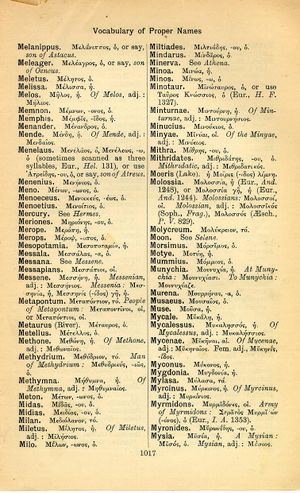Meleager
ἀκίνδυνοι δ' ἀρεταὶ οὔτε παρ' ἀνδράσιν οὔτ' ἐν ναυσὶ κοίλαις τίμιαι → but excellence without danger is honored neither among men nor in hollow ships
English > Greek (Woodhouse)
Μελέαγρος, ὁ, or say, son of Oeneus.
Latin > English (Lewis & Short)
Mĕlĕăger: and Mĕlĕăgros (-ag-rus), gri, m., = Μελέαγρος,
I son of the Calydonian king Œneus and Althæa, one of the combatants at the Calydonian boar-hunt. His life depended on the preservation of an extinguished brand; this his mother burned, out of revenge for the death of her brothers who had fallen by his hand, and he expired, Ov. M. 8, 299 sq.; id. H. 9, 151; Val. Fl. 1, 435; Hyg. Fab. 171 sq.; Serv. Verg. A. 7, 306.—Hence,
A Mĕlĕāgrēus, a, um, adj., of or belonging to Meleager, Luc. 6, 365.—
B Mĕlĕāgrĭdes, um, f.
1 The sisters of Meleager, who, according to the fable, bitterly lamented his death, and were changed into birds called after his name, Hyg. Fab. 174; Ov. M. 8, 534 sq.—
2 A kind of fowls, Guinea-hens, the same as Gallinae Africanae, or a variety of them, Varr. R. R. 3, 9, 18; Plin. 10, 26, 38, § 74.—
C Mĕlĕāgrĭus, a, um, adj., = Μελεάγριος, of or belonging to Meleager, Meleagrian, Stat. Th. 4, 103.
Latin > French (Gaffiot 2016)
Mĕlĕăgĕr¹¹ et -grus ou -grŏs, ī, m. (Μελέαγρος), Méléagre [qui tua le sanglier suscité par Diane pour ravager Calydon : Ov. M. 8, 299 ; Val. Flacc. 1, 435 ; Hyg. Fab. 171

